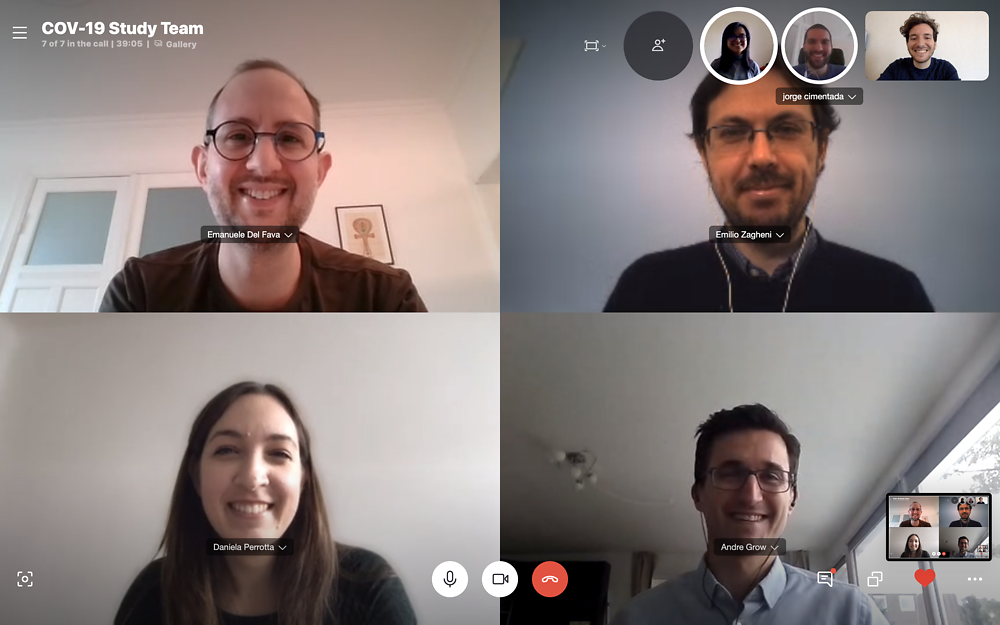March 20, 2020 | News | Interview
Coronavirus Survey: That Is What MPIDR Scientists Want to Find Out

In times of Corona the project team meets digitally. © MPIDR
Daniela Perrotta, André Grow, and a team of interdisciplinary scientists at the Max Planck Institute for Demographic Research (MPIDR), want to analyze people’s health behavior during the coronavirus pandemic. That is why they are currently conducting a survey via Facebook. In the interview, Daniela Perrotta and André Grow explain what they and their team want to find out.
Ms. Perrotta, Mr. Grow, why do you do a health behavior survey during the coronavirus pandemic?
The worldwide spread of a novel coronavirus hit our lives quickly and without warning. The way we live changed suddenly. We do not go to work or school anymore, we are supposed to stop attending public events or meeting friends. It also changed the way we make plans for the future. Over the past few days and weeks, we have witnessed how national and local governments are reacting differently to the emergency: school closures, smart working and cancellation of public gathering have been slowly implemented in an attempt to curb the coronavirus pandemic.
What is especially interesting for you as researchers?
Our knowledge about the reactions of individuals during epidemics remains quite limited. We want to get answers to questions like: What is the level of threat people perceive? How does this affect their behavior in terms of taking preventive measures? Or: how confident are they that their governments act effectively? We developed our survey to understand the extent to which people across socio-demographic groups behave differently in response to the coronavirus epidemic and are differentially affected by it. We also want to know how changes in social contact patterns, geographic mobility and behavior can, in turn, affect the epidemic itself.
In which countries do you conduct the survey?
We recruit respondents via the Facebook Advertising Platform in multiple countries. We are currently running the survey in Germany, Italy, France, Spain, the United Kingdom and the United States, and we are planning to add more countries soon. This approach enables us to quickly reach large numbers of survey participants across several countries and assess changes over time and space. Facebook usage varies across countries and participants recruited from Facebook are not necessarily representative of the general population, but we can account for that by appropriately reweighting the respondent samples in our analysis.
What do you do with the survey data?
We hope that our work will help to understand the current pandemic and improve the decision making for future outbreaks of similar diseases.
How do you want to achieve better understanding of the current pandemic?
Our survey addresses several aspects of the pandemic and people’s reaction to it. For example, we measure the perceived effectiveness of both preventive measures suggested by public health authorities and the control measures implemented by national governments. The level of trust in institutions and the level of perceived threat are key to understanding the extent to which people are willing to change their behavior and help mitigate the epidemic spread in the population.
Since this is a new strain of coronavirus and it has not been identified before in humans, people might perceive it differently. How do you measure these differences?
Yes, we do. We look at people’s perception of the severity of coronavirus versus influenza and assess how their responses differ across socio-demographic groups. Influenza is a well-known infectious disease and people are used to hearing about it every year in wintertime, whereas this novel coronavirus is totally new and this might have a stronger impact on people’s opinion and behavior.
Demographers are usually interested in social behavior. Do you want to analyze people’s reaction to the sudden change of their daily lives?
Absolutely. That is why we also collect social contact data. That is, the number of interactions that participants had in the previous days in different contexts, such as at home, at school or at work. A change in these numbers is an additional indication of the level of concern in the population and is a way of measuring whether people engage in ‘social distancing’, which is one central recommendation that national governments make to curb the pandemic.
To your team belong scientists from various disciplines. Why is this crucial to your research efforts?
On the one hand, our team consists of researchers with expertise in the modelling of infectious diseases. They have the knowledge that is necessary to design a survey that helps understanding how people’s behavior and attitudes affect the spread of the coronavirus. On the other hand, our team consists of researchers with the necessary expertise to leverage Facebook and its advertising facilities to recruit participants for our study.
Who is doing the survey?
Project leaders
Daniela Perrotta and André Grow
Project team
Jorge Cimentada
Emanuele Del Fava
Sofia Gil Clavel
Francesco Rampazzo
Emilio Zagheni
About the MPIDR
The Max Planck Institute for Demographic Research (MPIDR) in Rostock investigates the structure and dynamics of populations. The Institute’s researchers explore issues of political relevance, such as demographic change, aging, fertility, and the redistribution of work over the life course, as well as digitization and the use of new data sources for the estimation of migration flows. The MPIDR is one of the largest demographic research bodies in Europe and is a worldwide leader in the study of populations. The Institute is part of the Max Planck Society, the internationally renowned German research organization.